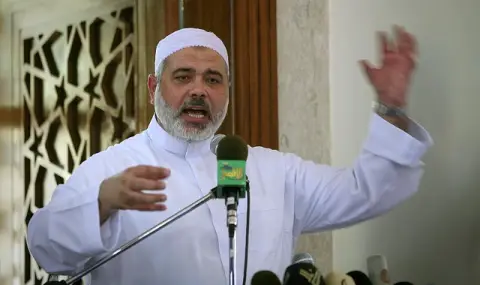No one has yet claimed responsibility responsibility for the assassination of Ismail Haniya in Tehran. Iran accuses Israel of maintaining an intelligence network in the country, and experts believe that without inside information the assassination would not have been possible.
Two days after Iran's Supreme Leader Ali Khamenei warmly welcomed Ismail Haniyeh to his office, he was due to offer prayers at the Hamas leader's funeral. The 85-year-old ayatollah appears to still be in shock over the killing of the political leader of the organization designated a terrorist organization by the US, the EU and other countries. At the funeral on the first of August, Khamenei repeatedly looked anxiously at the sky. At the time of the assassination, Haniya was staying at a guest house of the Iranian president.
Speculation about the murder
The presidential complex is located in a mountainous area north of Tehran. The area around it is freely accessible - mountain climbing is popular there. Hania may have been killed by a small quadcopter rigged with explosives, Neue Zürcher Zeitung reported. on July 31. The same assumption was made by the English-language Middle Eastern portal Amwaj.media. "I looked at the pictures of the building he was in. "Given the fact that there is not much material damage, I cannot judge exactly what weapon was used," says drone and missile systems expert Fabian Hinz.
"Damage to the building is minimal. It is entirely possible that a quadcopter drone was used. There are quadcopters that are guided in place, or those that are controlled via satellites and the Internet. But it is possible that we are talking about other ammunition as well."
Failure of security forces
The fact is that Chania's whereabouts were not a secret. This is far from his first visit to Tehran. He was last in Iran for the funeral of Ibrahim Raisi, who died in a helicopter crash. Now he was a guest at the inauguration ceremony of the new president - Masoud Pezeshkian. "Hania knew Tehran was not safe for him,” says terrorism researcher Guido Steinberg.
After the terrorist attack of Hamas against Israel on October 7, 2023, Israeli agents began to try to eliminate all the leaders of the Islamist group. "Israel did not want to attack Haniya in the Qatari capital, Doha, where he has lived for a long time and heads the political office of Hamas," Guido Steinberg said, adding: "Doha plays an important role in the negotiations between Israel and the Palestinians, and also so it's an ally of the US". Steinberg does not hide his surprise that Haniya was not better protected in Tehran. "He should have known that Israeli agents had infiltrated Tehran. Tehran is not even able to protect its own high-ranking people, such as nuclear researcher Mohsen Fakhrizadeh."
Fahrizadeh - one of the most guarded people in Iran, was killed in Tehran in 2020. He was a key figure in Iran's nuclear program. Israel views this program as a threat to its existence. Israel has been accused of sabotaging the program - for example with the Stuxnet virus in 2010, as well as the murders of several Iranian nuclear scientists.
Without inside information, the assassination would not have been possible
Iran and Israel have been sworn enemies for decades. Ever since the revolution in 1979, the leaders of the Islamic Republic have denied Israel's right to exist and threatened the "Zionist regime” with destruction. Iran is seen as a regional power and the center of real resistance to imperialism. Tehran supports the so-called "Axis of resistance” in the region - pro-Iranian extremist groups such as Hamas and Hezbollah.
"During the administration of President Raisi, we have destroyed the large Mossad network in Iran, which is behind sabotage against nuclear facilities and behind attacks on our scientists," Intelligence Minister Esmail Khatib said in an interview on state television on July 24. Only ten days later, however, Haniya - one of Iran's most important state guests - was assassinated in the presidential complex in the capital. The Israeli government has declined to comment on the death of the Hamas leader. However, Iran's Ayatollah Ali Khamenei openly blames Israel and threatens that there will be a "severe punishment".
"The cruelest revenge would be to identify and destroy Israel's internal network of influence in Iran," Ghorbanali Salavatyan, a former commander of the Revolutionary Guards, wrote on his profile on H. No information from the highest internal levels of the security apparatus, the targeted killing of the "martyr Haniya", who was under the protection of the president, would not be possible, the Iranian military is convinced.
